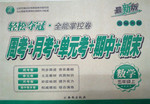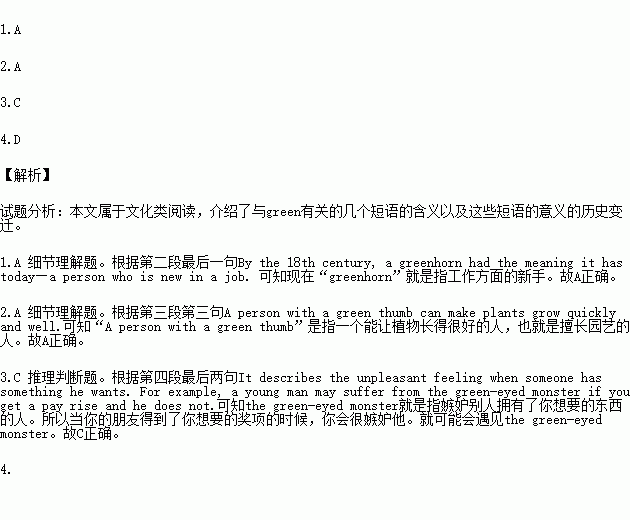题目内容
Green is an important color in nature. It is the color of grass and the leaves on trees. It is also the color of most growing plants.
Sometimes, the word “green” means young, fresh and growing. For example, a greenhorn is someone who has no experience. In the 15th century, a greenhorn was a young cow or an ox whose horns(角)had not yet developed. A century later, a greenhorn was a soldier who had no experience in war. By the 18th century, a greenhorn had the meaning it has today—a person who is new in a job.
Someone who is good at growing plants is said to have a green thumb(大拇指). The expression comes from the early 20th century. A person with a green thumb can make plants grow quickly and well. The Green Revolution(绿色革命)is the name given some years ago to the development of new kinds of rice and other grains. It was the result of hard work by agricultural scientists who had green thumbs.
Green is also the color used to describe the powerful feeling , jealousy(嫉妒). The green-eyed monster (怪物)is not a dangerous animal from outer space. It is an expression used about 400 years ago by the British writer William Shakespeare in his play “Othello”. It describes the unpleasant feeling when someone has something he wants. For example, a young man may suffer from the green-eyed monster if you get a pay rise and he does not.
In most places in the world, a green light is a signal(信号)to move ahead. In everyday speech, a green light means approval(赞成)to continue with a project.
1.A greenhorn now refers to ____________.
A. a person who is new in a job. B. a new soldier.
C. a young horse D. a cow without horns
2.A person with a green thumb is a person _______.
A. who is good at growing plants
B. whose thumbs are of green color
C. whose garden is greener than others'
D. who is younger than his neighbors
3.A man may meet the green-eyed monster if ____.
A. he sees a dangerous animal
B. he reads a sad play
C. his friend gets a prize that he wants
D. he can't get something
4.The main idea of the passage is ________.
A. a greenhorn
B. a green thumb
C. the Green Revolution
D. the word “green” and its story
 轻松夺冠全能掌控卷系列答案
轻松夺冠全能掌控卷系列答案

 logy wonderful
logy wonderful